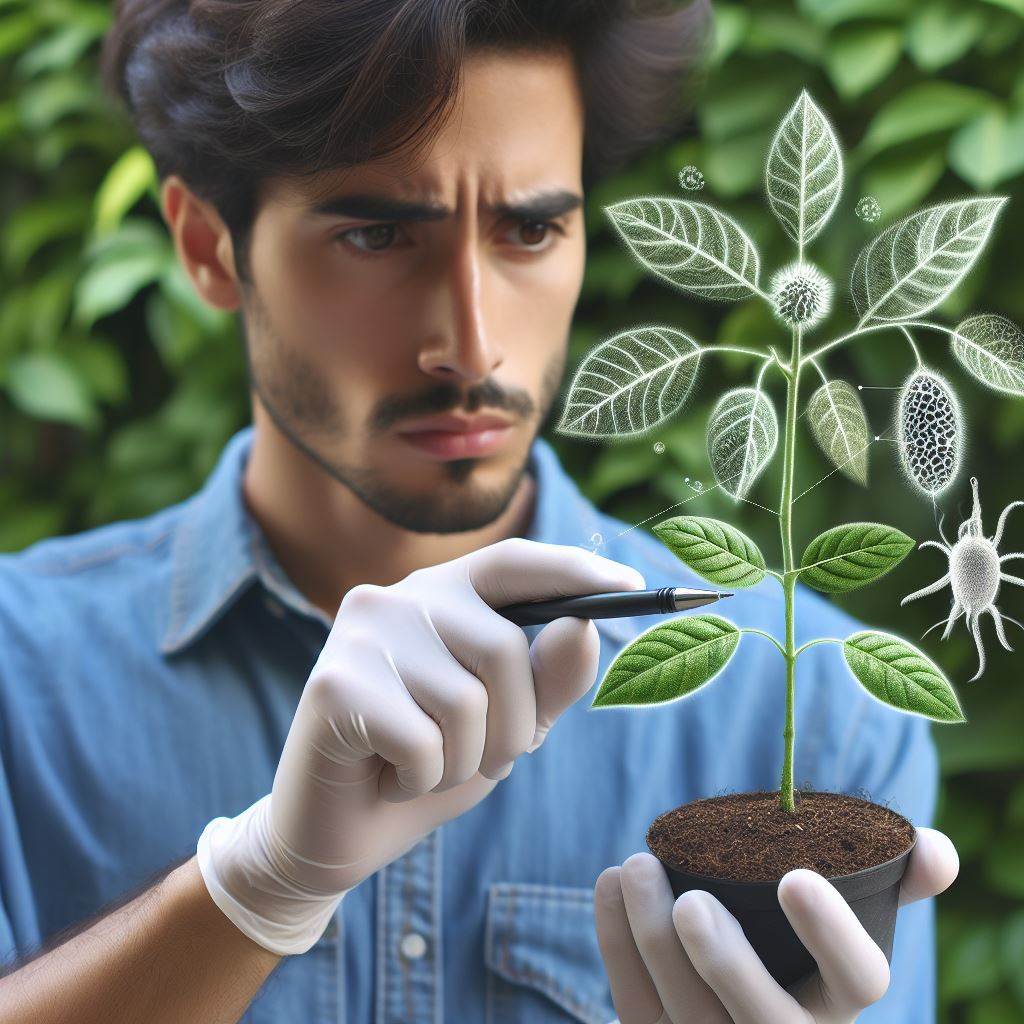Introduction
Soil health is paramount in gardening, serving as the foundation for thriving plants and abundant harvests.
Poor soil health leads to stunted growth, nutrient deficiencies, and increased susceptibility to pests and diseases.
The purpose of this blog post is to offer tips and information for maintaining and enhancing soil health in gardens:
- Understanding soil composition and structure.
- Implementing organic matter and composting practices.
- Testing soil pH and nutrient levels regularly.
- Incorporating cover crops and crop rotation.
- Minimizing tillage to preserve soil structure.
By prioritizing soil health, gardeners can cultivate robust ecosystems, ensuring long-term vitality and productivity.
Understanding Soil Health
Define soil health and its significance
Soil health refers to the overall condition of the soil that enables it to sustain plants, animals, and ecosystems.
It is essential for the productivity of gardens and agricultural lands.
Healthy soil maximizes nutrient availability, water retention, and root penetration, leading to thriving plants and increased crop yields.
The components of healthy soil (e.g., organic matter, soil structure, nutrient availability)
- Organic matter: Organic matter is the decaying plant and animal material in the soil. It provides essential nutrients, improves soil structure, enhances water-holding capacity, and promotes beneficial microbial activity.
- Soil structure: Soil structure refers to how individual soil particles bind together to form larger aggregates or clods. Good soil structure is essential for adequate water drainage, aeration, and root development.
- Nutrient availability: Healthy soil contains a balanced nutrient supply that is readily available to plants. It ensures proper growth, development, and overall vitality. Essential nutrients include nitrogen, phosphorus, potassium, calcium, and magnesium.
The role of soil organisms in maintaining soil health
- Bacteria: Bacteria are microscopic soil organisms that play a crucial role in nutrient recycling by decomposing organic matter and converting nutrients into forms that plants can absorb.
- Fungi: Fungi form a symbiotic relationship with plant roots, known as mycorrhizae, facilitating the nutrient uptake from the soil. They also decompose complex organic compounds and enhance soil structure.
- Earthworms: Earthworms aerate the soil by burrowing, allowing oxygen to reach plant roots. Their castings are rich in nutrients, improving soil fertility and enhancing drainage and water infiltration.
- Arthropods: Arthropods, such as ants and beetles, contribute to soil health by breaking down organic matter, assisting in nutrient cycling, and improving soil structure through their burrowing activities.
- Nematodes: Nematodes are microscopic roundworms that can be beneficial or harmful to soil health. Some species feed on harmful pests, while others attack plant roots, causing damage.
- Protozoa: Protozoa help regulate the microbial population in the soil by consuming bacteria and releasing nutrients through their waste. They also aid in nutrient availability for plants.
- Beneficial insects: Beneficial insects, like ladybugs and predatory mites, feed on harmful pests, reducing the need for chemical pesticides and promoting a balanced ecosystem in the soil.
Therefore, soil health is vital for thriving gardens and agricultural productivity.
It encompasses the presence of organic matter, proper soil structure, and nutrient availability.
Soil organisms, including bacteria, fungi, earthworms, arthropods, nematodes, protozoa, and beneficial insects, play a significant role in maintaining soil health by contributing to nutrient cycling, soil aeration, organic matter decomposition, and pest control.
By understanding and nurturing soil health, gardeners can create a sustainable and productive environment for their plants.
Read: Backyard Permaculture: Sustainable Techniques
Assessing Soil Health
Describe soil testing methods and their importance
Soil testing involves analyzing soil samples to determine nutrient content, pH levels, and organic matter.
It helps identify deficiencies and tailor fertilizer application.
Key parameters to consider when evaluating soil health (e.g., pH, nutrient levels, compaction)
When assessing soil health, pH levels should be within the optimal range for plant growth.
Transform Your Agribusiness
Unlock your farm's potential with expert advice tailored to your needs. Get actionable steps that drive real results.
Get StartedNutrient levels, including nitrogen, phosphorus, and potassium, should be balanced.
Compaction negatively affects root growth and water infiltration.
Importance of observation and visual assessment of soil health indicators (e.g., earthworm population, soil color, water infiltration)
Observation and visual assessment provide valuable insights into soil health.
Earthworm population indicates soil fertility and organic matter decomposition.
Soil color reflects organic matter content and drainage. Water infiltration shows soil’s ability to absorb and retain water.
Read: Edible Landscaping: Beauty and Bounty

Practices for Enhancing Soil Health
In order to enhance soil health and ensure thriving gardens, several practices can be implemented.
These practices include cover cropping and green manure, organic matter management, minimizing soil disturbance, mulching, and proper watering and irrigation.
Cover cropping and green manure
Cover cropping and green manure are beneficial practices that provide numerous advantages to the soil.
It helps prevent erosion, control weeds, improve soil structure, and increase organic matter content.
Depending on the region and season, suitable cover crops include clover, winter rye, and buckwheat.
These crops can be incorporated into the garden by planting them during fallow periods or between main crops.
Organic matter management
Organic matter management is crucial for enhancing soil health.
Adding organic matter, such as compost, leaf litter, and manure, improves soil fertility, structure, and water-holding capacity.
Organic matter can be directly applied to the soil or mixed into it, ensuring its efficient incorporation into the garden.
Minimizing soil disturbance
Minimizing soil disturbance is another essential practice for maintaining soil health.
Excessive tilling and soil compaction can lead to the degradation of soil structure and fertility.
Alternative gardening methods like no-till gardening and raised beds help minimize soil disturbance, preserving the integrity and health of the soil.
Mulching
Mulching is another effective technique to enhance soil health in gardens.
Mulch materials, such as straw, wood chips, and leaves, provide several benefits, including moisture conservation, weed suppression, and soil temperature moderation.
Correct application of mulch involves spreading a layer around plants, ensuring there is no direct contact with the stems.
Proper watering and irrigation
Proper watering and irrigation practices play a vital role in soil health.
Water management should be carefully considered to prevent both over-watering and under-watering, as these conditions can negatively impact the soil and plant health.
Implementing watering techniques that cater to specific plant needs and utilizing efficient irrigation systems, like drip irrigation, promotes optimal water use for healthy soil and thriving gardens.
Showcase Your Farming Business
Publish your professional farming services profile on our blog for a one-time fee of $200 and reach a dedicated audience of farmers and agribusiness owners.
Publish Your ProfileBy incorporating these practices for enhancing soil health into gardening routines, individuals can create thriving gardens that are not only visually appealing but also environmentally sustainable.
These practices contribute to the long-term health and productivity of the soil, ensuring the success of garden plants and promoting overall garden sustainability.
Read: Soil pH Matters: Testing and Adjusting Tips
Maintaining Soil Health
Regular soil testing
Regular soil testing is crucial for maintaining the health of your garden’s soil.
By conducting periodic soil tests, you can gain valuable insights into the quality and nutrient content of the soil.
This information allows you to make informed decisions regarding the necessary amendments and adjustments for optimal plant growth.
Regular soil testing provides numerous benefits when it comes to monitoring soil health over time.
By comparing the results of multiple tests, you can track changes in nutrient levels, pH, and other vital soil parameters.
This long-term monitoring allows you to identify potential issues before they become major problems, making it easier to address them effectively.
Crop rotation
Crop rotation is a valuable practice for preventing soil-borne diseases and nutrient imbalances.
By varying the types of plants grown in specific areas of your garden over different seasons, you can disrupt pest and disease cycles while also improving soil health.
To implement crop rotation successfully, it’s essential to follow specific guidelines.
First, avoid planting crops from the same family in consecutive growing seasons, as this can deplete specific nutrients and increase the risk of disease buildup.
Instead, opt for a diverse rotation plan that incorporates different plant families and takes into account the nutrient needs of each crop.
Weed management
Weeds can have a significant impact on soil health, competing with desired plants for nutrients, space, and sunlight.
Additionally, weeds can serve as hosts for pests and diseases, further jeopardizing the health of your garden.
Effectively managing weeds without damaging the soil requires a multifaceted approach.
Regularly removing weeds by hand or using appropriate tools helps prevent them from establishing a strong foothold.
Additionally, applying layers of organic mulch can discourage weed growth while simultaneously enriching the soil as it decomposes.
Nutrient management
Balanced nutrient levels in the soil are fundamental for plant growth and overall soil health.
Providing the right amount of essential nutrients ensures that your plants thrive and are less susceptible to diseases and nutrient deficiencies.
To maintain sufficient nutrient levels, consider using organic fertilizers and compost.
These natural amendments slowly release nutrients into the soil, promoting long-term soil health and reducing the risk of nutrient imbalances.
Additionally, avoid excessive fertilization, as it can lead to nutrient runoff and potential harm to the environment.
In short, maintaining soil health in your garden is vital for thriving plants and a productive growing environment.
Regular soil testing, implementing crop rotation, effective weed management, and proper nutrient management are all essential practices to ensure the long-term health and productivity of your garden’s soil.
By prioritizing soil health, you can create an environment where your plants can flourish and provide bountiful harvests year after year.
Read: Herb Gardening: Flavorful and Easy
Conclusion
Summarize the key points discussed in the blog post
In this blog post, we explored the importance of soil health for thriving gardens.
We discussed how soil serves as the foundation for plant growth and provided valuable tips for enhancing and maintaining soil health.
The key points we covered include the significance of organic matter in enriching the soil, the role of beneficial microorganisms in breaking down nutrients, and the importance of proper watering and mulching practices.
We also emphasized the need for regular soil testing to assess nutrient levels and pH balance, as well as the benefits of cover cropping and crop rotation for reducing soil erosion and disease incidence.
Reinforce the importance of maintaining soil health for thriving gardens
Maintaining soil health is crucial for the long-term success of any garden.
By having nutrient-rich soil, plants can absorb the necessary elements for growth, leading to healthier and more productive plants.
Healthy soil also improves water infiltration and retention, promoting efficient water use and reducing the risk of drought stress.
Additionally, it supports diverse soil organisms, creating a balanced ecosystem that further benefits plant health.
Encouragement to implement the suggested practices for enhancing and maintaining soil health in their own gardens
We encourage readers to apply the suggested practices discussed in this blog post to enhance and maintain soil health in their own gardens.
By incorporating organic matter, practicing proper watering and mulching techniques, regularly testing the soil, and adopting cover cropping and crop rotation strategies, gardeners can create an optimal growing environment for their plants.
Remember, healthy soil is the foundation for thriving gardens, and by taking care of the soil, you’ll reap the rewards of vibrant and bountiful plants.




